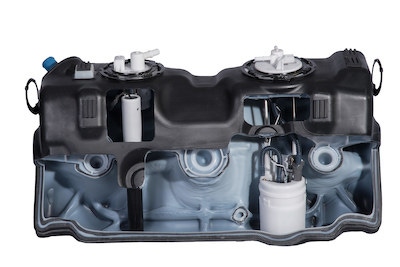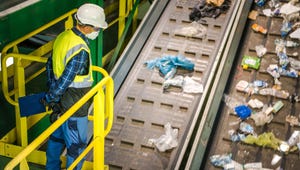TI Automotive (Auburn Hills, MI) supplies double-wall tanks for Irvine, CA–based Karma Automotive's luxury electric vehicle program.
January 25, 2019

Perhaps surprisingly, the performance demands placed on fuel tanks used in extended-range electric vehicles (EREVs) can be higher than those used than in conventional internal combustion engine vehicles. Take the plastic fuel tank blowmolded by TI Automotive (Auburn Hills, MI) that is used in EREVs like the luxury cars being produced by Karma in Irvine, CA. TI Automotive's industry-leading technology allows the lightweight plastic tanks to handle the high vapor pressures that are created in EREVs.
|
Fuel tanks for extended-range electric vehicles need to be able to endure high vapor pressures. |
Starting next fall, the tank will be part of a new Karma luxury electric vehicle, representing the global introduction of TI Automotive's double-molded tank for HEV applications. This plastic tank, already being used by pre-production validation vehicles, not only weighs significantly less than traditional steel tanks but also tolerates fuel vapor pressurization up to 500 mbar. This allows optimization of the vehicle's full electric operating range driving mode. TI Automotive manufactures this tank using its patented and 2014 PACE innovation-awarded Tank Advance Process Technology (TAPT) manufacturing process.
TAPT is a flexible manufacturing process that makes it possible to produce multiple types of fuel tanks for all types of powertrains—diesel, gasoline, flex-fuel, Partial Zero Emissions Vehicles (PZEV) and hybrid—from a single design blow tooling set. Currently, OEMs traditionally source the different vehicle tanks by engine type or regional differences. TAPT allows for global standardization of complete vehicle platforms.
The new production process expands on TI Automotive’s 2009 Automotive News PACE Award–winning Ship-in-a-Bottle (SIB) fuel tank, in which a pre-loaded carrier assembly was inserted into the plastic parison during blowmolding. While SIB enabled production of the world’s first plastic PZEV saddle fuel tank, placement of fuel system components was limited on some applications due to the 10-inch (25.5-cm) plastic parison opening.
During TAPT, a pre-formed, blowmolded parison is separated into two halves while a robot inserts the fuel system components into designated areas of the tank assembly—without size or location limitations. The entire process takes less than one minute and uses existing blowmolding equipment, with the key added enabler of gripper features in the mold tooling design.
"TI Automotive is using its design and manufacturing technologies to develop a wide range of advanced plastic tank products to meet and exceed various EREV fuel vapor pressure requirements. The double-molded tank for Karma's vehicle represents our highest performing product for the diverse luxury electric vehicle market. Our global customers are very excited about this technology advancement as we continue to expand our fluid handling leadership," said Hans Dieltjens, Executive Vice President, Fuel Tank and Delivery Systems.
Karma currently produces two luxury electric vehicles, the Revero and limited-edition Aliso, both of which are designed to deliver distinctive luxury electric vehicle experiences through innovative design, technology and personalization. The automaker's future is supported by a well-funded business strategy and product plan that spans into the next decade, according to Bob Kruse, Karma's Chief Technology Officer.
"We have the right people in place to achieve our goals, a robust pipeline of new products and relationships with the right partners who can help us accelerate technology and product development," Kruse explained. "Few electric grand touring vehicles in the world can match the performance, luxury and efficiency of the current Karma Revero, and TI Automotive's innovative plastic fuel tank technology will enable our next-generation luxury electric vehicles to achieve even greater levels of performance."
About the Author(s)
You May Also Like





